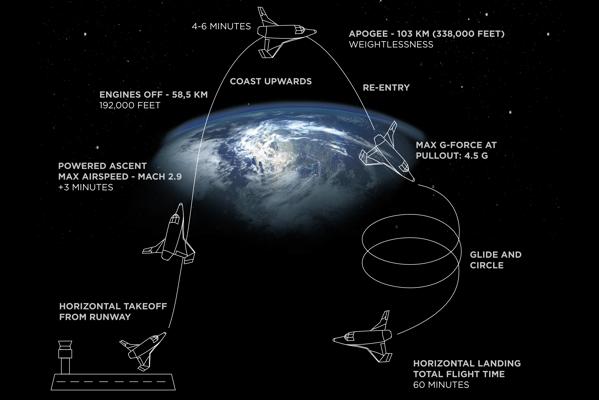
This diagram shows the flight path for tourists who book private space flights with XCOR Aeronautics. The $100,000 journeys will take travelers 103 kilometers above the planet, breaching the Karman line, space’s official border. About 10 percent of bookings to date are by Chinese.[Photo/China Daily]
The sky’s no longer the limit for Chinese tourists.
Space is the final frontier for the country’s wealthy travelers.
Most have already traveled to the ends of the Earth-many, like Beijing banker Tong Jingjing, have visited the poles-and some seek to journey even farther.
About 10 percent, or 32, of the people who’ve signed up for private space flights offered by the US company XCOR Aerospace are Chinese.
.jpg)
Wealthy Chinese are propelling space tourism’s blastoff.[Photo/China Daily]
“There is new wealth being generated in China with much of it being young wealth, (people) who want to show off and be adventurous,” Space Tourism Society founder and president John Spencer says.
“This is the same pattern that always happens in growing economies.”
That may be why chief executive of XCOR’s Asia operation Alex Tang told media that China’s affluent seem more willing to travel into space than rich people in other countries.
A survey of 203 travelers by Shanghai’s research company Hurun found 7 percent of the country’s luxury travelers aspire to fly into space within three years. “China’s rich history of explorers and achievement, and their influences on the rest of the world, makes the country an exciting and natural market for commercial space tourism,” XCOR’s competitor Virgin Galactic says in an e-mail interview.
However, Virgin Galactic can’t carry passengers from about two-dozen countries, including China, because of US International Traffic in Arms restrictions.
-U10663838648VMI-U10715168901JnH-600x400@English.gov.cn.jpg)
Virgin Galactic hopes US law will soon change to allow Chinese to take its private space flights.[Photo/China Daily]
“(But) upcoming rulings from the US government may enable Virgin Galactic to open its spaceflight service even more broadly in the not-too-distant future,” the company says.
Du Xiyong, vice-president of XCOR’s exclusive booking agency in China, Dexo Travel, says his company was surprised by its success selling tickets on China’s biggest e-commerce site, Taobao.
“Most people have never heard of private space flights,” he says.
“We hoped to boost awareness in China via Taobao, which boasts tens of millions of users. We didn’t expect to sell any tickets on the platform. But the results exceeded our expectations.
“Spaceflight isn’t like buying a luxury brand car or visiting beaches to enjoy oneself. It’s more like a challenge for one’s mind and spirit.”
Sheng Tianxing, whose name translates as Skywalker, like the hero of the Star Wars franchise, believes his discovery and purchase of the tickets on Taobao was, perhaps, written in the stars.
“Maybe it’s God’s plan,” the 41-year-old says.
The tea trader from Zhejiang province has been a sci-fi fan since he was a village youth.
Sheng’s parents chose the name, which less directly translates as “working to progress”, from the ancient Chinese text Book of Changes.
Science fact, in addition to science fiction, also inspires Sheng’s aspirations. The avid traveler, who has been to more than 20 countries, doesn’t consider his space trip to be tourism.
“It’s my way to show my respect for science and technology,” he says.
“Science is a belief system. I marvel at scientific development. It makes anything possible.”
He believes taking private space flights will become as common as riding in cars.
“It’s the future,” he says.
“Just think about the shock when the first car was produced a century ago. I hope in the future I can buy a space travel package provided by a Chinese company. And I believe that will happen.”
China’s first private aerospace company, Link Space, received a 16 million yuan ($2.6 million) investment after its founder and CEO, 21-year-old Hu Zhenyu, successfully launched his first rocket from the Inner Mongolia autonomous region last year.
National enthusiasm for space travel has been fueled by the country’s advancements in the field, from astronaut Yang Liwei’s 2003 orbit around the planet to the recent soft landing of China’s lunar probe-the world’s first in 37 years, which made China the third country to achieve such a feat after the former USSR and the United States.
“China’s space exploration has cultivated a group of Chinese with the dream to go into space,” Du says.
Sheng plans to take the trip 103 kilometers above Earth’s surface in 2016. Paying the full cost of about $100,000 up front gives him a better chance of catching an earlier flight, according to a lottery system used to distribute the seats. Those who pay a deposit of half the cost must wait longer.
The 103-km flights-which pass through the Karman line, the official edge of space-are expected to begin once XCOR’s Lynx II begins commercial flights in about two years.
The Lynx I is scheduled to begin offering trips 61 km above the planet at the end of next year, at a cost of $95,000 per seat.
The lower-altitude trips will last about an hour, including roughly seven minutes in space during which passengers can see about a third of the Earth.
“It’s God’s view of our planet,” Du says. “It’s a life-changing experience.”
He believes more people, especially Chinese, will undertake the flights because they’re affordable to many and don’t have stringent health requirements.
“You don’t have to train like an astronaut,” he says.
Most clients are male business owners, mainly entrepreneurs, aged 35 to 50, he says.
Chinese Mandopop vocalist and actor Han Geng has bought a ticket, completed training at NASA and acquired sponsors, Du says. Singer Deng Ziqi is also reported to have booked a flight.
Du believes private space journeys will become more commonplace among ordinary people as technology advances. “The ticket prices will decline and more people will go into space,” he says.
“The sci-fi movie scenes we see will become part of real life. And China will become the biggest market.”
